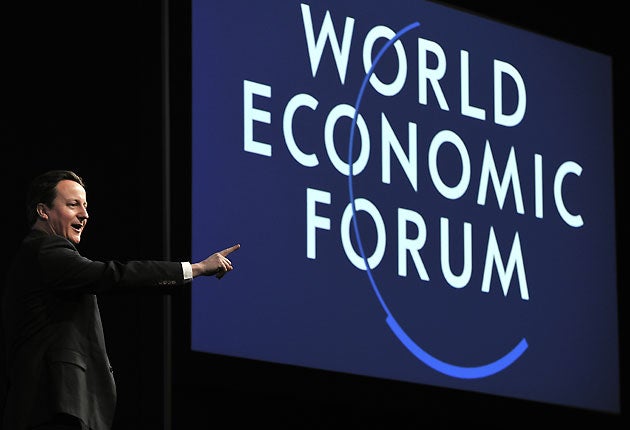Cameron and Osborne vow to stick with cuts

Your support helps us to tell the story
From reproductive rights to climate change to Big Tech, The Independent is on the ground when the story is developing. Whether it's investigating the financials of Elon Musk's pro-Trump PAC or producing our latest documentary, 'The A Word', which shines a light on the American women fighting for reproductive rights, we know how important it is to parse out the facts from the messaging.
At such a critical moment in US history, we need reporters on the ground. Your donation allows us to keep sending journalists to speak to both sides of the story.
The Independent is trusted by Americans across the entire political spectrum. And unlike many other quality news outlets, we choose not to lock Americans out of our reporting and analysis with paywalls. We believe quality journalism should be available to everyone, paid for by those who can afford it.
Your support makes all the difference.David Cameron and George Osborne today insisted they would stick to their spending cuts programme despite deepening economic gloom and renewed threats of coordinated strike action.
The Prime Minister used a speech at the World Economic Forum in Davos, Switzerland, to stress that there were "no short-cuts" to a stronger economy.
In a separate speech in the Swiss ski resort, the Chancellor dismissed the "siren voices" urging the Government to pull back from the cuts.
Union officials met in London today to discuss the prospect of industrial action over the pay freeze and job cuts in the public sector.
After the growth figures earlier this week showed the economy shrank by 0.5% in the final quarter of 2010, research published today showed a dramatic fall in consumer confidence.
Mr Cameron warned that the scale of the challenge facing the British economy was "immense" and required a long-term "transformation".
"It's going to be tough - but we must see it through. The scale of the task is immense, so we need to be bold in order to build this economy of the future," he said.
"The British people know these things. They understand there are no shortcuts to a better future."
He added: "Those who argue that dealing with our deficit and promoting growth are somehow alternatives are wrong. You cannot put off the first in order to promote the second."
Labour has accused the Conservative-Liberal Democrat Government of sacrificing growth with overly aggressive spending cuts.
Mr Osborne said today that heeding Labour's calls would lead to "disaster".
"It's clear that for some that temptation remains - a bit more government spending here, pumping the bubble back up a bit there," he told a business leaders' lunch.
"We are absolutely clear - allowing ourselves to be seduced by those siren voices would only lead to even greater disaster down the line.
"Right now the right long-term choices for the economy are the difficult choices. Adjustment will not be without struggle."
The Chancellor promised to use the forthcoming Budget to tackle "the forces of stagnation" in the British economy.
Acknowledging calls for lower taxes and less regulation, the Chancellor said he would be as "bold" in unleashing enterprise as he had been in cutting the deficit.
He stressed that he wanted "the most competitive business tax regime of any major Western economy" and that he was "very conscious" of the effects of current levels of personal tax.
"Our competitiveness has suffered a lost decade," he said.
"That is why this coalition Government will be just as bold in promoting enterprise as we have been in dealing with the deficit.
"The ambition of my Budget on the 23rd of March will be to turn the tide on the forces of stagnation."
His comments came as Conservative Mayor of London Boris Johnson urged Mr Osborne to "set a course for low tax" in the Budget.
Earlier this week Sir Richard Lambert, the outgoing head of the CBI, also called for a "road map" towards lower personal taxes.
The head of the TUC warned today that coordinated industrial action was under consideration as unions step up their campaign against the Government's programme.
Brendan Barber said the public sector unions would be meeting monthly.
"No-one is talking about a general strike, but of course these attacks on our members could well give rise to industrial action around specific disputes," he said.
"Today's meeting showed a clear determination for unions to work together on industrial issues including, as a last resort, industrial action when members support it.
"The TUC will step up its work co-ordinating the industrial work of unions."
Former prime minister Tony Blair cast doubt on this week's growth figures when he was asked about them today.
Shadow chancellor Ed Balls lost no time blaming the 0.5% decline on the coalition's policies when the figures were released, but Mr Blair appeared to support Mr Osborne's contention that the weather was to blame.
Speaking to Bloomberg, Mr Blair said: "I don't think anyone quite knows what those figures mean at the moment, frankly.
"We did have a spell of really, really bad weather in the UK. That must have had an impact on the retail sector. I just don't think you can tell."
He said the task for the Government was to reduce the deficit without choking off growth.
But he added: "Personally, I regard that not as a left/right issue. It's a matter of judgment. And it's for the government of the day to make that judgment."
Subscribe to Independent Premium to bookmark this article
Want to bookmark your favourite articles and stories to read or reference later? Start your Independent Premium subscription today.
Join our commenting forum
Join thought-provoking conversations, follow other Independent readers and see their replies
Comments